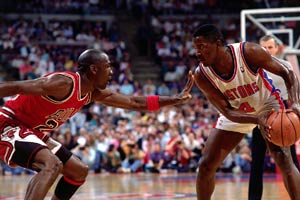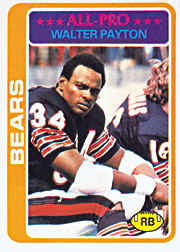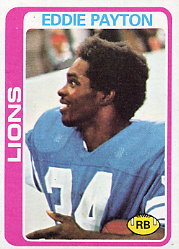Dennis Rodman. Ben Wallace. John Salley. Magglio Ordonez. Al Simmons. Chris Chelios. Erik Kramer. Bobby Layne. All of these prominent sports figures from past and present have one thing in common: they have played for teams in both Chicago and Detroit during their careers. Chicago sports teams might have individual rivals from cities other than Detroit such as the Green Bay Packers and St. Louis Cardinals that are more pronounced. However, Chicago and Detroit are linked by having geographically defined and historic rivalries in every sport across the board whether it’s in the professional or college (when taking into account the Big Ten plus Notre Dame) ranks. Not even New York vs. Boston (they have the pro sports covered, but you couldn’t pay enough money to the average person on the street to watch Rutgers play Boston College in anything on the college front) or Los Angeles vs. San Francisco (L.A. doesn’t have an NFL team while the Bay Area only has a quasi-NBA franchise in the Warriors) have sets of sports rivalries that run as wide and deep as Chicago vs. Detroit. With the important series between the White Sox and Tigers (the Sox took game 1 last night after a marvelous performance by Jon Garland) occurring this week, here’s my ranking of the top Chicago vs. Detroit rivalries taking into account history and present fervor:
1) Bulls vs. Pistons – As I’ve stated before, the Bad Boy Pistons were the first team I ever had pure hatred for during my childhood. During the late-1980s and early-1990s, this was the most heated rivalry in all of sports with annual nationally televised Christmas Day matchups at the old Chicago Stadium and inevitable meetings in the NBA Playoffs, coming to a peak when the Pistons walked off of the court after being eliminated by the Bulls in 1991 without even acknowledging Michael Jordan and his team. The rivalry subsided when the Bulls, during their 1990s dynasty, eventually found new foils in the Knicks and Pacers and then the Pistons rose back to dominance after the start of the new millennium right when Chicago went into the cellar. However, with Ben Wallace defecting from a Motown fan base that loved him to go to Chicago out of all places (the basketball equivalent of Johnny Damon spurning the Red Sox for the Yankees), these two franchises are going to be rekindling that old hatred this season and beyond.

2) Notre Dame vs. Michigan – Michigan fans will tell you that while Ohio State, without question, is their biggest rival, they save their harshest vitriol for the Irish. At the same time, even though Domers count USC as their most important game of the season, there’s a certain respect for the Trojans in contrast to the pure hatred for the Wolverines. Notre Dame and Michigan are the two winningest programs in college football history with fight songs that are beaten into everyone’s heads, whether or not they care one iota about these teams, from birth. When you add in the pompous fans on both sides, the only thing comparable to this game is watching the Yankees play themselves in an intrasquad game: you hope there’s a way that both teams can lose. Regardless of how much I might hate these teams, the college football season really doesn’t start until Notre Dame plays Michigan in September.
(Sidenote: I really wish I could put Illinois vs. Michigan on this list, but I’ve learned over time that the “rivalry” is completely one-sided with my Illini brethren. Now, the most emotionally scarring sports moment that I have ever witnessed at an event that I actually attended was the 2000 Illinois – Michigan football game, where the Illini had the game stolen by the Big Ten referees who, with less than four minutes left in the game with Illinois ahead, incorrectly called a fumble by Illinois’ Rocky Harvey when he was actually down and then seconds later inexplicably didn’t call a fumble on Michigan’s Anthony Thomas when he dropped the ball when his knees weren’t anywhere near close to the ground. Michigan would go on to score the winning touchdown on that drive. The errors were so egregious that the Big Ten issued an unprecedented apology to Illinois a couple of days later and spurred the conference to begin using instant replay. What happened in Champaign that Saturday evening wasn’t a case of heartbreak a la Illinois losing in the 2005 NCAA Championship Game. Instead, it was probably the only time I’ve ever felt completely violated after watching a sporting event. To say the least, my disdain for Michigan peaked at that point.
However, when I went to law school at DePaul, the two undergraduate schools that matriculated the most students there by a substantial margin were Illinois and Michigan. Everytime I spewed my anger toward the Maize and Blue, my Michigan alum classmates were sincerely and genuinely perplexed. They had absolutely no feelings toward playing us whatsoever. In fact, a number of them upon moving to Chicago even started cheering for Illinois when they weren’t playing Michigan. They simply didn’t think about us at all as any sort of rival – we might as well have been Northern Illinois. While learning about this apathy was initially even more enraging from a personal standpoint, it also made me realize that Illinois vs. Michigan was a fictional rivalry and we, as Illini fans, look pretty petty into making the matchup into something more than what it actually is. This is now so apparent across the Big Ten that the Michigan Daily even had an article a couple of years ago examining how much we hate them in contrast to their ambivalence toward us. From that point on, I decided that if I was going to hate a team that really wasn’t a true rival of the Illini, I’d redirect more of my sports rage toward someone outside of the Big Ten: Duke. Of course, that’s not to say that I won’t continue to drop “Muck Fichigan” lines at every opportunity.)
3) Bears vs. Lions – In 1934, the Detroit Lions began their tradition of playing on every Thanksgiving Day by matching up against the Chicago Bears. When examining longevity and frequency, only the Packers are bigger rivals to the Bears than the Lions. While in terms of sporting excellence this rivalry has seen better days, the Bears and Lions are, year-in and year-out regardless of records, the most important franchises in their respective cities. So, as we wait for Matt Millen to put together an offensive formation that features one quarterback and ten wide receivers, we can appreciate the history between these two NFL teams along with the passionate fan bases that they bring to the table.


4) Blackhawks vs. Red Wings – As I mentioned a few weeks ago, this rivalry once would have been the clear and undisputed #1 on this list. However, this matchup is looking more like Illinois vs. Michigan as opposed to Bulls vs. Pistons with every inept team that the Blackhawks trot out on the ice. Still, there’s incredible history here, from their mutual status as Original Six franchises to the Bobby Hull vs. Gordie Howe boxing matches.
5) Illinois vs. Michigan State – A continually growing college basketball rivalry that is based more on excellence as opposed to bad blood. When looking at the Big Ten over the past decade, these two programs have perennially been at the top of the conference, which makes their annual matchups that much more important. For the record, if I had to pick the one head coach in college basketball other than Bruce Weber that I respect and admire over everyone else, it would definitely be the Spartans’ Tom Izzo.

6) White Sox vs. Tigers – This season, these two teams are battling for supremacy in the American League. I’ve got to rank this rivalry at #6, however, because they have spent the last one hundred seasons as pretty lackluster franchises. It wasn’t very long ago that the Tigers were battling to avoid losing 120 games in a season, while the White Sox finally broke an 88-year World Series championship drought in 2005. If these two clubs can sustain some success over multiple seasons after this year, then we’ll have another true rivalry on our hands.
And finally…
7) Cubs vs. Tigers – This isn’t a real rivalry at all, but it serves me with an opportunity to remind my readers that are Cubs fans that your team (a) hasn’t won a World Series since 1908, when they defeated none other than the Detroit Tigers in five games and (b) hasn’t won a National League pennant since 1945, when they then lost to the Detroit Tigers in the World Series in the maximum seven games. The Circle of Life continues (as well as the Curse of the Billy Goat).
(Images from Pistons.com, Beckett.com, Beckett.com, FightingIllini.com)
